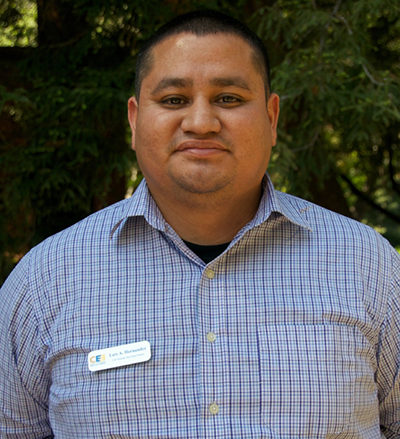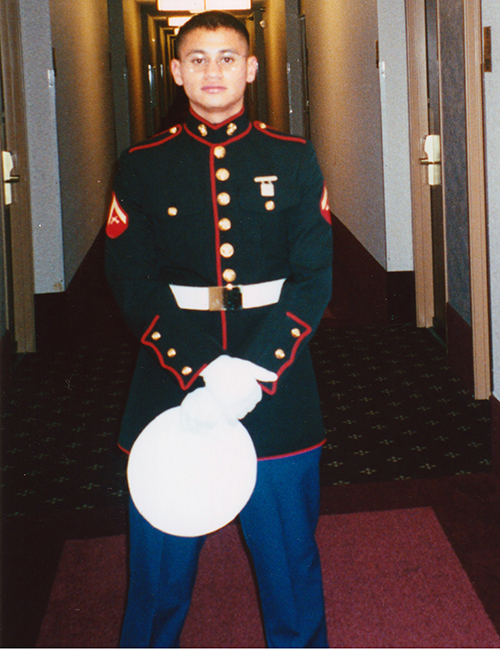Why student-veterans should not be seen as a political monolith
UC Berkeley Cal Veterans coordinator Luis Hernandez explains how veterans are boxed into outdated generalizations and the diversity they bring to UC Berkeley
November 10, 2020

UC Berkeley’s Cal Veteran Services Center consists of staff and students from diverse backgrounds, but all with the common bond of serving the country. (Photo courtesy of Luis Hernandez)
The perception of student military veterans, or all service members, for that matter, as a monolith of PTSD-ridden, politically conservative voters is not only inaccurate, it’s outdated. That’s according to Luis Hernandez, who has worked in military veteran services for nearly 10 years and is program coordinator for UC Berkeley’s Cal Veteran Services Center.
“Veterans are people who come from all walks of life, comprised of experiences that came during their military service, before and after,” said Hernandez, who himself served as an avionics technician in the U.S. Marine Corps after graduating from high school. “The diversity of life experiences veterans have informs their politics. … We’ve had veterans who have joined the College Republicans on campus, and vets who have been part of the more left-leaning groups. They cover the entire political spectrum.”

Luis Hernandez has worked at UC Berkeley’s Cal Veteran Services Center for seven years. (Photo courtesy of Luis Hernandez)
Hernandez, along with a team of 12 Berkeley student peer advisers, provide academic services and counseling resources to student-veterans on campus and to students who are the dependents of military veterans.
A Berkeley alumnus, Hernandez majored in anthropology and first began working for Cal Veteran Services Center as a student intern helping with outreach efforts to veterans across the state. After graduating in 2010, he went on to work in San Jose, working to get older, homeless veterans access to housing and the military benefits they deserved.
After observing the challenges many homeless veterans faced — many of them did not have a college degree — Hernandez came back to Berkeley, initially as an academic achievement counselor, to help prevent Berkeley’s student-veterans from falling out of higher education and into homelessness.
Hernandez spoke with Berkeley News recently about the diversity of the more than 300 students that the Cal Vets center serves and how their life experiences inform the unique perspectives they bring to campus.
Berkeley News: What issues do student-veterans face that the greater public may not know about?
Luis Hernandez: To a great extent, I think a lot of the issues that our students are dealing with are intersectional with a lot of other student populations. We have a lot of students who are student-parents, low-income and first-generation. Of all these different sorts of identities that they carry with them, being a military veteran is just an added layer to it.
The issues they are going through are similar to those student populations, as well. A lot of folks will generalize student-veterans and say, ‘Oh, you must have served in combat,’ or a lot of vets get the question, ‘Did you kill somebody?’ which is something you should not ask a veteran.
There is also this assumption that all student-veterans have post-traumatic stress disorder, or other mental health issues that are so traumatic that they are ready to snap at any given moment. While those issues do exist, it’s not always to that extreme, and through Cal Veterans programs, we’re able to help them navigate health appointments and other services they need.
For the most part, although they do get benefits for their service, they are also dealing with similar issues as other students, of trying to find work or balancing their schedules and mapping out a pathway to graduating.
It seems like there is a good amount of diversity in Berkeley’s student-veteran community. Do you think that benefits the greater campus?
Yes, there is diversity as far as ethnic backgrounds and where people are from. But as far as a diversity of experiences, it is very different from veteran to veteran. Some have served in combat, some have not. Some have been deployed, some have never left the U.S.
So, their experiences are very different and diverse.

Luis Hernandez poses in his Marine Corps uniform after completing bootcamp in San Diego, Calif. Hernandez joined the corps immediately after graduating from his Hayward high school in 1999. (Photo courtesy of Luis Hernandez)
Traveling around the world and having those different experiences, whether that be combat- related or non-combat-related, and just the leadership experience and leadership roles they have been put into and are trained for while in the military, can give them a different perspective, compared to a student who came to Berkeley right out of high school.
I, myself, was on the 31st Marine Expeditionary Unit, and I went to Okinawa, Japan, South Korea and, from there, traveled all over Southeast Asia. But I was never in combat. My brother, on the other hand, is a combat veteran and he was part of the initial invasion of Iraq.
Talking with our student-veterans, just the stories that they have from living in these remote areas of the world and interacting with the individuals who are from those parts of the world, it’s truly a unique experience. They bring those experiences to campus and are able to share in their classes and coursework, which I see as a major benefit for our campus community.
Do you think that diversity also is represented in their political affiliations?
Our student-veterans are, again, pretty diverse when it comes to politics, as well. We have some that are left-leaning, some that are right-leaning, some conservative and some liberal. We’ve had all of those identities on campus, and we also have all of those identities in the campus population.
In the past, we’ve had vets who were part of the College Republicans group, and some who were part of the super left-leaning groups. Ultimately, I think my role, and our center’s role, is to serve students within their academic career, regardless of what their political affiliations are.
I think we sometimes see veterans being used on social media for political agendas from both ends of the political spectrum. To say, ‘Oh, you see, there is a veteran who supports a Republican,’ or, ‘Here is one who supports a Democrat,’ and then veterans are grouped into those agendas.
But I think that’s really important to note that veterans are people who come from all walks of life, comprised of experiences that came during their military service, before and after.

UC Berkeley student-veterans have built a community with Cal Veteran Services Center. Here they pose at a gathering prior to the COVID-19 pandemic. (Photo courtesy of Luis Hernandez)
Just because you’re in the military, yes, you are trained to do certain things, and you are sort of trained to have, or understand, the culture of the military. It doesn’t mean that folks don’t have other previous life experiences that they bring with them, as well.
It’s interesting, you know, because the military, as an institution, always tries to be apolitical. The veteran center on campus, we also try to be apolitical. But at certain times, I feel like that’s a political statement in itself. I mean, everything is, in some way or another, political, whether it be funding to bureaucracy, to the way things are done, it is just always there.
But I think the focus for Berkeley’s student-veterans is that we have this common experience that ties us all together to be able to navigate Berkeley, and that is what we try to hold onto to build a community that we can help and bring services to, together.
With that said, Joe Biden has been declared the new president-elect. Will the transition to a new administration impact student-veterans?
So, as far as the post-9/11 benefits, they are going to still continue the way they are, as far as I know.
With new administrations, I think concern sometimes does come up, as far as the budget and funding that Veterans Affairs gets, overall, but we don’t get federal funding to run our center. So, that definitely doesn’t impact us.
I think, more so, what we look for in any president is that they appoint competent staff and competent leaders to run Veterans Affairs. That’s what we can hope for, moving forward.